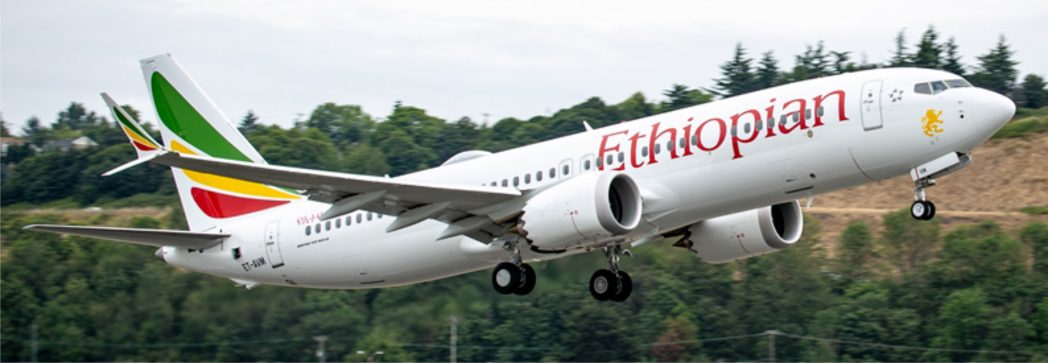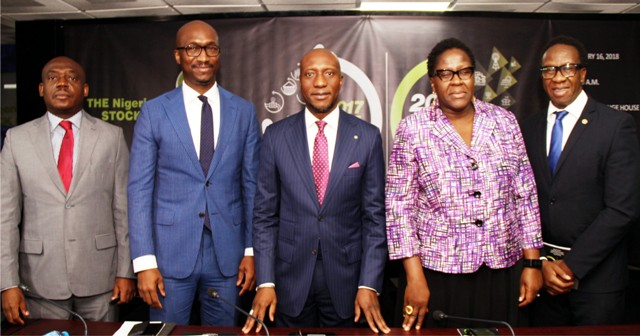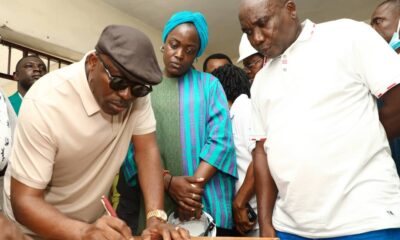Business
Domestic Airlines Reject Nigeria, Ethiopia National Carrier Partnership

Domestic airline operators in Nigeria, under the aegis of Air Operators of Nigeria (AON) have said the proposed partnership between the Federal Government and Ethiopian Airlines to form a national carrier scheduled to begin operations by December, is not going down well with them.
The airline operators sai the agreement was tantamount to opening the nation’s domestic airline market to a foreign carrier, a development they feel could ‘decimate’ the local airline industry and lead to capital flight.
Spokesperson of AON, Prof. Obiora Okonkwo, who is also the Chairman of the United Airlines, who disclosed this in a statement made available to Aviation correspondents, queried the transparency and shareholding structure of the Nigeria Air.
”We have not seen anything Nigerian in this Nigeria Air. It is a camouflage of interest. The decision to set up a national carrier in partnership with Ethiopian Airlines is a policy somersault. The people in government have continued to demonise the local operators.
“Aviation companies have collapsed in other parts of the world, not only in Nigeria. What the aviation sector needs is support. The private sector will collapse with this (national carrier) arrangement. Nigeria will be losing much. It must not be allowed to be sustained. There is nothing Nigerian in this Nigeria Air”, he said.
According to AON, the proposed national airline would help Ethiopian Airlines to achieve its domination of the African market, adding that the Ethiopian national carrier had formed similar agreements in eight other African countries.
”This approach will decimate the local market. Agreement with Ethiopian Airlines will create cabotage. Ethiopian Airlines will come into our domestic market, lower fares (non-competitive fares) with the aim of taking over the market. The choice of Ethiopian Airlines will destroy our industry. We reject this totally.
“In anticipation of the Single African Air Transport Market, Ethiopian Airlines want to dominate the African market. The government is meant to support local carriers. Ethiopian Airlines has partnerships in eight other countries in Africa.
“They currently have 135 planes. The CEO of the airline has said they plan to increase their fleet to 250 planes in the next five years. The intent is to go into the domestic market of all the African countries where they have footprints.
“This is simply aviation colonialism. If we take all of this onboard, you will wonder whether the government has the interest of Nigerian airlines at heart or not.
“With Ethiopian Airlines having 49 per cent stake in the proposed national carrier, it would be difficult for Nigerian Air to fly intercontinental routes.
“We do not think this is the best thing happening. It is not genuine. We reject it. Nigeria Air will not suffer any fate different from what befell the defunct Virgin Nigeria that could not go to the United States. This is clear in the Bilateral Air Services Agreement regulations”, he stated.
Meanwhile, an aviation expert and aeronautical engineer, Babatunde Adeniji, has also faulted the shareholding structure of the carrier.
”I don’t share the sentiment. The arrangement is such that you are using government funds to bring a competitor that will distort the market.
“We need to create a level-playing field. How can we make the industry sustainable? There is a need for transparency in the whole process of setting up a national carrier.
“The local carriers are not being supported. Aviation fuel issues and forex access problems which affect their capacity to maintain aircraft are not addressed.
“Everywhere we talk about the poor performance of Nigerian airlines but we do not support them. We need to support them to grow”, he stated.
By: Corlins Walter
Business
Over $1.5bn Spent To Protect Nigeria’s Oil Installations -FG

The Federal Government has said it has spent over $1.5 billion from 2020 to date to protect the nation’s oil installations and curb crude oil theft.
The Secretary to the Government of the Federation (SGF), George Akume, made this known, yesterday, at a public hearing of the House of Representatives on crude oil theft.
Akume was represented by the Permanent Secretary, General Services, Maurice Nandi.
The Federal Government was concerned about the report from the Nigerian Extractive Industries Transparency Initiative (NEITI), which pointed to over $46 billion worth of stolen crude between 2009 and 2020.
“The House had set up a special committee, headed by the Chairman of the House Committee on Petroleum Upstream, Ado Doguwa, to investigate the losses in the oil and gas sector,” Akume said.
Additionally, Speaker of the House Tajudeen Abbas, represented by Deputy Speaker Benjamin Kalu, said $10 billion has been lost in seven months to crude oil theft.
Business
FG Unveils Metering Project Teams To Combat Oil Theft

The Nigerian Upstream Petroleum Regulatory Commission (NUPRC) has inaugurated Metering Audit and Advance Cargo Declaration project teams, to promote transparency and accountability in the upstream oil and gas.
The Commission’s Chief Executive, Mr Gbenga Komolafe, who spoke at the inauguration of the project teams, on Wednesday in Abuja, said the projects were designed to combat crude oil theft and boost revenue.
It will be recalled that the Federal Executive Council (FEC) had approved a 21 million dollars contract to audit metering and measurement equipment in the 187 oil flow stations in the country and also put in place an advance cargo declaration solution.
These initiatives as earlier announced by Minister of State for Petroleum Resources Sen. Heineken Lokpobiri, aims at enhancing monitoring and accountability in crude oil production and distribution, addressing rampant oil theft.
Komolafe, while inaugurating the project monitoring teams, announced a four-month deadline for the completion of the projects.
According to him, the initiatives zre in line with NUPRC’s mandate to ensure optimal government revenues from upstream petroleum operations, as specified in the Petroleum Industry Act (PIA) 2021.
He said the projects would be executed by PE Energy Limited and P-Lyne Energy.
“Audit of Upstream Measurement Equipment and Facilities project aims to establish reliable baseline data for all measurement points, identify gaps in production and allocation measurement, and implement targeted interventions to enhance metering infrastructure.
“This project is crucial in addressing issues such as the presence of obsolete equipment, lack of a comprehensive database and absence of real-time production measurement across many locations.
“Advance Cargo Declaration Solution complements the metering audit by establishing a robust system for declaring and tracking crude oil transportation and exports from Nigeria,” he said.
He said the project would monitor and account for the movement of crude oil within the country, prevent disruptions, theft, and under-declaration, and ensure that only certified products were being exported.
“It will also enable real-time tracking, reconciliation, and reporting of crude oil exports to facilitate accurate revenue billing and generation.
“For a long time as a nation we have suffered from the menace of crude oil theft and there have been contentions on the accuracy in terms of our hydrocarbon accounting in Nigeria in a manner that has impacted our federal revenue unfavourably.
“So what has happened is that the commission, within its assumption of office, has been able, as a regulator, to take a very bold measure to address this issue.
“We have 31 crude oil loading terminals. So we are trying to ensure that we put in place a framework where the nation will be able to accurately determine and measure the volume of crude that is loaded from these terminals,” he said.
He tasked the teams, comprising experts from various NUPRC’s departments, to discharge their duties professionally, adding that the projects would be delivered within four months, while any request for timeline extension would not be entertained.
The NURPC boss said that each project had a dedicated team, led by Mr Enorense Amadasu, Executive Commissioner for Development and Production, NURPC, with strict timelines for completion.
While commending President Bola Tinubu for his support, Komolafe urged stakeholders to cooperate with the teams to facilitate successful implementation of the projects.
“Team for Audit of Upstream Measurement Equipment and Facilities in the Nigerian Oil and Gas Industry” project comprise ; Manuel Ibituroko – Deputy Director, Facilities Engineering & Optimisation; Mohammed Sirajo – Manager, Facilities Engineering; Ike Chidi – Manager, Facilities Engineering; and Bashir Shariff – Principal Regulatory Officer.
“Team for Advance Cargo Declaration Solution” project, comprise: Bello Shehu – Assistant Director, Crude Oil & Gas terminal Operations; Abdulrahman Idris – Manager, Petroleum Accounting; Omeje Desmond – Deputy Manager, COTO PHC; Dimkpa I. H. – PRO, COTO Warri and Olatunji Babatunde – NDR”.
He said the teams would liaise with the contractors to ensure the fulfilment of the Commission’s specified obligations and monitoring the implementation of the projects to ensure alignment with the scope and specifications.
Responding, one of the two contractors, Chief Executive Officer, PE Energy Ltd, Daere Akobo, thanked the Federal Government for the confidence repose in them to take a pragmatic look at hydrocarbon accounting.
Also, the Director, P-Lyne Energy, Tomi Ogunwole assured that the company would abide by the four-month deadline set by the commission.
Business
FG Launches Blueprint For Africa’s Digital Trade
The Federal Government of Nigeria has launched a comprehensive strategy to spearhead Africa’s digital trade revolution, aligning with the African Continental Free Trade Agreement (AfCFTA) framework.
The initiative, a key component of President Bola Tinubu’s Renewed Hope Agenda, is aimed at leveraging trade as a driver of economic growth and continental unity in accordance with AfCFTA’s objectives.
According to Vice President Kashim Shettima, in his X handle (formerly twitter), “Nigeria is in a unique position to spearhead the continent’s technological transformation”.
He said the strategy includes implementing AfCFTA’s Digital Trade Protocol, developing technical talent hubs, enhancing digital infrastructure investments, and promoting innovation and entrepreneurship.
Shettima stated this while delivering a keynote address during a stakeholders’ summit with the theme, “Digital Trade in Africa: The Renewed Hope Strategy”, at the Presidential Villa, Abuja.
The Vice President emphasised the need for public-private sector synergy and assured continued government investment in digital infrastructure and human capital development.
On his part, the Minister of Communications, Innovation, and Digital Economy, Bosun Tijjani, highlighted the Tinubu administration’s substantial investments in all aspects of the digital trade protocol, aiming at harnessing opportunities both in Nigeria and across the continent.
He stated that innovative policies and programmes, such as the Three Million Technical Talent programme, the data protection policy, and increased investments in digital infrastructure, were equipping Nigeria’s young population for current and future opportunities.
Tijjani stressed the critical role of technology in facilitating trade across Africa, noting that the unprecedented opportunities within the single market area could be best leveraged through effective collaboration and networking enabled by digital technology.
-
Business3 days ago
NGX Digital Investment Platform Gets SEC Approval
-
Niger Delta3 days ago
Investigate Benin Airport Attack, Edo Urges RG
-

 News1 day ago
News1 day agoStock Market Trends Downward, Investors Lose N118bn
-
Rivers1 day ago
Fubara Tasks Churches On Prayers
-
News3 days ago
Stop Triggering Man-Made Disasters, NSCDC Warns Nigerians
-
Sports3 days ago
Simplified Football Cup Competition To Commence, Aug 12
-

 News1 day ago
News1 day agoFubara Gives Scholarship To 100 Children, Widows Of Fallen Heroes
-
Nation1 day ago
Senate Passes Bill To Ensure Uninterrupted Tenure Of IGPs

